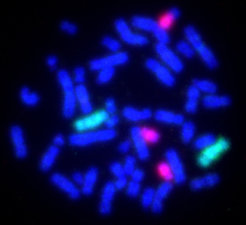Chromosomes: the importance of keeping the balance

Before every cell division, the hereditary information, that is the chromosomes, are duplicated and distributed to the daughter cells so that each cell again carries its species-specific number of chromosomes, which is 46 in humans. „ Mistakes can occur at any time during the process of cell division“, explains Zuzana Storchová, the head of the Genome Stability research group. „The chromosomes can be divided unequally and in this way one human cell carries 47 chromosomes while the other carries 45 chromosomes“.
It is known that chromosome imbalance, called aneuploidy, often occurs early in the development of cancer. Aneuploidy probably even appears before the much-feared gene mutations, which are thought to be the cause of cancer. „We wanted to know whether a change in the number of chromosomes directly contributes to gene mutations”, explains Storchová.
To answer this question, the researchers took advantage of a method that has until now been successfully used by only a small number of research groups worldwide: chromosome transfer. In a first step, single chromosomes are isolated and then transferred to recipient cells. The specific effects of aneuploidy can be deciphered in detail by directly comparing with identical cells that do not carry the extra chromosome. To get a detailed understanding of the changes in the genome of aneuploid cells, the researchers teamed up with the group of Batsheva Kerem from the University of Jerusalem and the group of Wigard Kloosterman from the University Medical Center in Utrecht. In fact, Storchova’s team and their collaborators observed that aneuploid cells exhibited a clearly elevated rate of DNA damage as well as an enhanced level of DNA rearrangements.
„We see that an imbalance in chromosome numbers has serious consequences, because the chromosomes contain genes, which are the construction manuals for all the different proteins inside a cell. Proteins are the executors of a vast array of important cellular functions and operate like little molecular machines“, explains Verena Passerini from Storchova‘s team and the first author of the study. „If there are too many or too few chromosomes, inside a cell, then there will be a corresponding increase or decrease in the amount of proteins that are made. This probably causes cell stress and leads to cellular damage“. In this way, the whole cellular system loses its balance.
The researchers could also identify a responsible factor: The MCM2-7 protein complex that is essential for DNA replication during cell division. In the aneuploid cells there was less MCM2-7 present than normal. The reduced levels of MCM2-7 impair DNA replication, which in turn leads to chromosomal rearrangements and mutations. These defects could be partially corrected by increasing the levels of MCM2-7.
„We could now show for the first time what profound effects aneuploidy can have on important cellular functions: An alteration in chromosome number causes stress during DNA replication, which leads to genetic instability“, summarizes Storchová.
It is now clear that certain defects that appear at the beginning of tumor development, such as aneuploidy, promote further damage in their wake. „It has been very difficult to understand the early stages of tumor development", says Storchová. „Our aneuploid cells represent a new model system for processes that drive cancer development."
Original publication:
V. Passerini, E. Ozeri-Galai, M. S. de Pagter, N. Donnelly, S. Schmalbrock, W. P. Kloosterman, B. Kerem, Z. Storchová: The presence of extra chromosomes leads to genomic instability, Nature Communications, February 2016
DOI: 10.1038/NCOMMS10754

